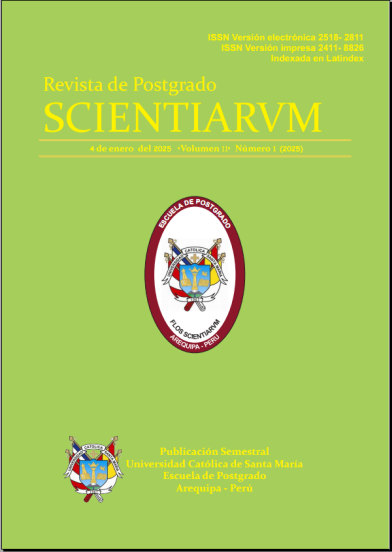LA ORALIDAD EN EL ÁMBITO PENAL Y CIVIL, DE LO TEÓRICO A LO PRÁCTICO
ORALITY IN THE CRIMINAL AND CIVIL LAW, FROM THE THEORETICAL TO THE PRACTICAL
Lizbeth Gabriela Salas Olin1, Alejandra Tito Chauca1,
Abby Olbry Manrique Retamoso1
- Universidad Católica de Santa María, Arequipa – Perú
RESUMEN: Desde 2004 con la implementación del Nuevo Código Procesal Penal, se dieron cambios vanguardistas en el proceso penal peruano, siendo el más impactante, la predominancia de la oralidad sobre la escrituralidad, es así que debemos tomar en cuenta que se deja de lado el modelo inquisitivo por el acusatorio, siendo que por un lado el fiscal debe perseguir el delito, el defensor resguarda los derechos del imputado y el juez toma las decisiones respecto a las actuaciones de ambos, resultando dicha mutación en el impulso necesario para todas las etapas del mismo, logrando así un completo desenvolvimiento procesal, donde cada parte deja de limitarse a leer, para hacerse oír y actuar, para verídicamente objetar y alegar.
Mientras que en el proceso civil, el cambio se dio recientemente un 26 de diciembre del 2018 en la Corte Superior de Justicia de la ciudad blanca, es así que del mismo modo al versar sobre un modelo mixto, podemos entender su finalidad, la combinación de inmediación, celeridad y motivación, pero con la notable característica de que en este caso serán dos adversarios con las mismas posibilidades, los cuales debatirán frente a un juez que dejará el trámite para netamente dirigir el proceso, controlando de manera pragmática cada instante del proceso en un intercambio de actuaciones procesales vivas, erradicando la imagen del abogado y juez de escritorio, para tener presente un juicio dinámico, por lo que cabría analizar la adaptación de los letrados y los futuros litigantes a este innovador proyecto que trae consigo las audiencias preliminar y de juzgamiento.
Palabras claves: Oralidad Civil, Litigación Oral, Procesal Civil, Conciliación, Procesal Penal, Inmediación, Celeridad, Flexibilidad Procesal, Adaptación Jurídica.
ABSTRACT: Since 2004 with the implementation of the New Code of Criminal Procedure, there have been avant-garde changes in the Peruvian criminal process, the most striking being the predominance of orality over literacy, so we must take into account that the inquisitive model is left aside. by the accuser, being that on the one hand the prosecutor must prosecute the crime, the defender protects the rights of the accused and the judge makes the decisions regarding the actions of both, resulting in said mutation in the necessary impulse for all the stages of the same, thus achieving a complete procedural development, where each party ceases to limit itself to reading, to be heard and act, to truthfully object and allege.
While in the civil process, the change occurred recently on December 26, 2018 in the Superior Court of Justice of the white city, it is so that in the same way when dealing with a mixed model, we can understand its purpose, the combination of immediacy, speed and motivation, but with the remarkable characteristic that in this case there will be two opponents with the same possibilities, who will debate in front of a judge who will leave the procedure to clearly direct the process, pragmatically controlling every moment of the process in an exchange of living procedural actions, eradicating the image of the desk lawyer and judge, to keep in mind a dynamic trial, so it would be worth analyzing the adaptation of the lawyers and future litigants to this innovative project that brings with it the preliminary hearings and judgment.
Key words: Civil Orality, Oral Litigation, Civil Procedure, Conciliation, Criminal Procedure, Immediacy, Speed, Procedural Flexibility, Legal Adaptation.
Revista Seleccionada
Enero 2025 Volumen 11 - Número 1 P 3-7
DOI: 10.26696/sci.epg.0193
Enlaces
CIENCIAS SOCIALES Y HUMANIDADES
LA ORALIDAD EN EL ÁMBITO PENAL Y CIVIL, DE LO TEÓRICO A LO PRÁCTICO
IMPACTO DE LA CREACIÓN DE VALOR COMPARTIDO EN LA INDUSTRIA MINERA LATINOAMERICANA
CIENCIAS BIOLÓGICAS Y DE SALUD
PRESENCIA DE SALMONELLA TYPHI EN UNA BEBIDA TÍPICA PERUANA “PISCO SOUR”, AREQUIPA 2023

